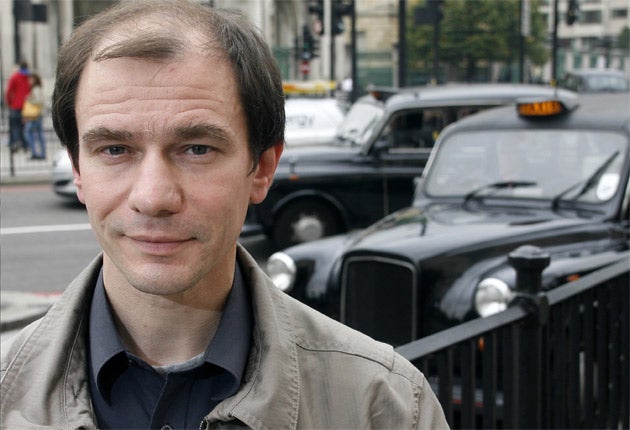Spy-swap scientist pays a price for his freedom
Igor Sutyagin dreams of Russia but is trapped in a legal limbo

Your support helps us to tell the story
From reproductive rights to climate change to Big Tech, The Independent is on the ground when the story is developing. Whether it's investigating the financials of Elon Musk's pro-Trump PAC or producing our latest documentary, 'The A Word', which shines a light on the American women fighting for reproductive rights, we know how important it is to parse out the facts from the messaging.
At such a critical moment in US history, we need reporters on the ground. Your donation allows us to keep sending journalists to speak to both sides of the story.
The Independent is trusted by Americans across the entire political spectrum. And unlike many other quality news outlets, we choose not to lock Americans out of our reporting and analysis with paywalls. We believe quality journalism should be available to everyone, paid for by those who can afford it.
Your support makes all the difference.It was the most sensational spy story since the Cold War. Eleven Russian secret agents unmasked in the US, bundled on to a plane, and handed over on the tarmac of Vienna airport in exchange for four Russians jailed as Western spies by Moscow.
Igor Sutyagin was among the four, but he was the only one whose journey brought him to Britain, his alleged paymaster. The problem for the scientist was that despite serving a decade in jail, much of it in a gulag in the Russian Arctic on charges of passing military intelligence to Britain, he had little, if any, connection to the UK. There wasn't even anyone to meet the plane that dropped him and his few belongings off at Brize Norton.
Nearly three months on the 45-year-old, who denies, with the full backing of the US, that he was ever a spy, is relieved to be in London rather than the prison in which he hauled wood, taught English to his guards and wrote thousands of letters to keep himself sane. He remains trapped however, in a personal and legal limbo, pining for his wife Irina and two daughters, desperate to be back in his homeland, but afraid to return to Russia in fear of being rearrested under a legal system he says is fatally corrupt and flawed.
"All I want is to try to replace those eleven years I've lost and to rebuild a future for my family," he said. Yet, while the academic describes dreaming of Russia "in the way British sailors used to dream of the White Cliffs of Dover", the "non-existence" of the rule of law in his homeland makes his return impossible. He was never issued with a written pardon and so, under Russian law, he fears he could be branded an escaped convict and rearrested.
His fears he says are based on knowing at least eight other academics who are languishing in jail on trumped-up charges. The physicist Valentin Danilov is one; he is serving 14 years for handling sensitive information on spacecraft which, Mr Sutyagin said was at least seven years old. His own conviction, in 1999, was widely condemned as a travesty by human rights groups including Amnesty International, which adopted him as the first political prisoner of the Putin era. The "Sutyagin affair" was seen as part of a political campaign to intimidate academics. He said the "non-existence" of the rule of law in Russia was a massive obstacle to the country's modernisation.
Looking back, the scientist recalls the dilemma of that day in July when he was suddenly informed he could be a free man, but that he first had to sign an admission of guilt. "It was a very clear deal, honour for freedom," he said in London yesterday.
The Faustian pact for a man who had protested his innocence for 10 years was that only when he changed his plea and accepted he had committed treason would either he, or the other spies in the swap, be freed. "I was told, if you say 'no', then the whole deal is off." He was given less than two hours to think about the offer, which had been, he was told, authorised "at the very highest level, by the two presidents [Obama and Medvedev]". He signed a pre-written "confession" as the price for a pardon from President Medvedev.
"I had to think about my family. I felt that they had been imprisoned with me throughout and I needed to free them, too. I also had to think about all those others [alleged spies]. You need to spend 10 years in jail to understand that you don't want anyone else to be in that situation. In some ways, those 11 were officers of my country, good or bad, they played a role on behalf of my country."
Where are they now?
Anna Chapman
Back in Russia, she moves around Moscow in a hat and dark glasses but has announced she is launching a self-promotional website. A political career has also been mentioned.
Vicky Palaez
A journalist and the only one of the spies who was not a Russian citizen, she was deported to Moscow, a place she had never even visited. She turned down an offer of $2,000 a month from the Russian government and has been attempting to return to her native Peru.
Richard and Cynthia Murphy
The married couple, in real life Lydia and Vladimir Guryev, have been given accomodation in Moscow and 'Cynthia's' credentials as a financial planner in the US were revoked this week.
Join our commenting forum
Join thought-provoking conversations, follow other Independent readers and see their replies
Comments